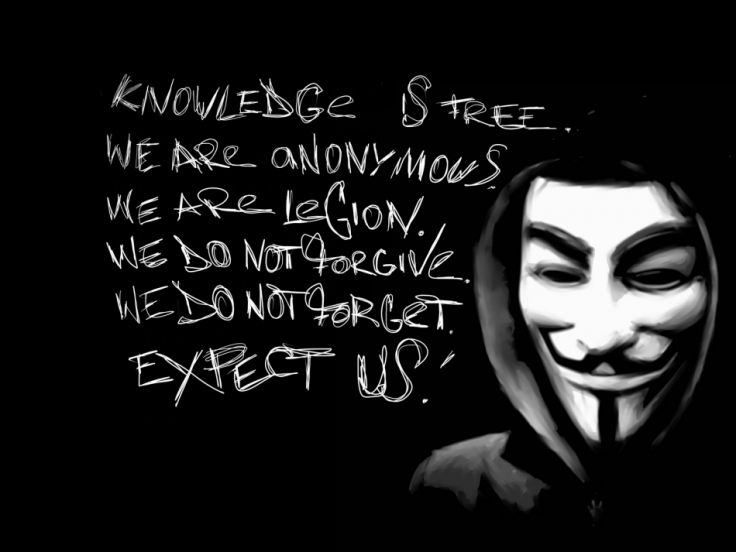AntiSec Stratfor Hack: Is Anonymous on the Brink of Civil War?

With conflicting statements regarding the Stratfor cyber attack being posted in Anonymous' name, security analysts have come to question whether the collective is as unified as it would have the world believe.
The Attack
Anonymous announced the attack on Stratfor 26 December via a post on the Pastebin website. In its statement the collective claimed to have successfully bypassed Stratfor's online security stealing roughly 50,000 credit card numbers, 87,000 email addresses and 44,000 encrypted passwords.
As well as stealing the data, Anonymous' statement went on to claim that the group had already used the stolen credit information to donate $500,000 to a number of unnamed charities. Stratfor itself is a Texas-based company that produces analysis on international security issues. Its client list includes numerous banks, oil companies and law enforcement agencies.
The attack was later confirmed by Stratfor's chief executive, George Friedman, via the company's Facebook page. "On December 24th an unauthorized party disclosed personally identifiable information and related credit card data of some of our members," read Friedman's opening comment.
Later adding: "We are also working to restore access to our website and continuing to work closely with law enforcement regarding these matters."
Divided Opinion?
Questions regarding whether Anonymous members (Anons) were united in their support for the attack when, alongside the post claiming responsibility, another statement appeared on Pastebin - also allegedly from Anonymous - claiming it had played no part in the hack.
Addressing the new post, an amendment to the original statement was added reaffirming Anonymous was responsible for the attack.
"SPECIAL NOTICE: We are aware that there has been some confusion as to whether the STRATFOR hack is an "official" Anonymous operation, due to a ridiculous 'Emergency Anonymous Press Statement' being circulated, undermining our work while also making baseless accusations that we frequently see perpetrated by agent provocateurs. Whether this is the work of malicious counter-intelligence,, [sic] some butthurt pacifists, or [S]tratfor employees themselves is unknown," read the amendment.
Despite Anonymous' standard information outlets insistence that the collective was responsible for the attack, numerous publications and research groups have taken the conflicting reports as evidence that the group was not unified in its support for the hack.
McAfee's Prophesy
Speculation that the Anonymous collective was going through an ideological schism reached new heights when security firm McAfee issued its own report suggesting the collective would need to "reinvent" itself to survive.
In its 2012 Threat Predictions paper McAffee reported its belief that the collective had grown beyond its means. Specifically, analysts suggested that Anonymous growth meant that the collective's founding hacktivist members were now a minority, not necessarily representative of the group as a whole. The lack of cohesion was cited as a key reason for the company's prediction.
"The 'true' Anonymous (that is, its historical wing) will reinvent themselves and their scene or die out.
If the Anonymous circles of influence are unable to become organized-with clear calls for action and
responsibility claims-all those labeling themselves Anonymous will eventually run the risk of becoming
marginalized," read McAffee's report.
Unfounded Allegations?
Since McAfee published its paper Anonymous has issued a slew of statements responding to the allegations. In the statements the members all moved to clarify that Anon's right to disagree and voice their own opinion has always been central to the collective's core belief in the freedom of information.
"Unfortunately, some main stream news agencies have picked up on this statement, looking for any reason to highlight and exploit any potential 'inner divisions"'within Anonymous. However, there has been no such squabble or infighting regarding the STRATFOR target, or any other LulzXmas target for that matter," read one statement.
Continuing: "Anyone can claim to be Anonymous, but because of the inherent decentralized nature of Anonymous, without central top-down leadership, no individual is in a place to speak to the legitimacy of another individual or group's operation."
Following up, the AnonymousIRC Twitter feed issued its own feedback on McAffee's report commenting: "orly, McAffee? McAfee says #Anonymous will reorganize or disband in 2012 http://bit.ly/vYiYT3 #OWS #Penis."
While colourful in their use of language, the Anons' comments are in keeping with previous speculation regarding how Anonymous chooses its targets.
Operating on an open IRC channel, the collective allows any user to join and become an Anon. Though the information is far from official, Anonymous reportedly picks its targets in a democratic way, with participants in the chat putting forward their chosen target and arguing their case to the other members as to why the proposed target deserves Anonymous' attention.
If accurate the fact that not all the members agreed with the collective's attack should come as no surprise. However, this is not to say McAffee's prediction is entirely without merit. As noted in the International Business Times UK's previous summary, "2011 The Year of the Hacktivist: When Anonymous Finally Grew-Up," Anonymous is currently in a state of flux.
As demonstrated by its ongoing, entirely legal, support for the Occupy movement, Anonymous is attracting new, activist, as opposed to hacktivist, members. While this shift in behaviour doesn't necessarily mean the collective will dissolve, it does indicate that 2012 will be an interesting time, when each Anon will have to choose the future direction of Anonymous.
© Copyright IBTimes 2025. All rights reserved.



















